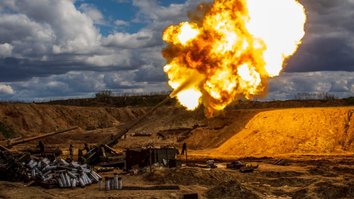Pakistani Prime Minister Imran Khan's ill-timed visit to Moscow to meet Russian President Vladimir Putin, just as Russian forces were invading Ukraine, is likely to strain Islamabad's relations with Washington and Brussels, say analysts and politicians.
Khan's two-day trip that started on February 23 has been heavily criticised in Pakistan, with opposition parties and analysts questioning its utility.
Hours after his arrival, Russian troops invaded Ukraine on various fronts on Thursday, starting the biggest war in Europe since 1945.
Even before Khan sat with Putin on Thursday, his visit was overshadowed by the widespread international condemnation of Russia's invasion of Ukraine.
Pakistan's opposition political parties bashed Khan on meeting with Putin and said that the timing of the trip was a "diplomatic disaster".
"Khan has gone to Russia at the verge of war," said Sherry Rehman, a member of the Senate and a leader of the Pakistan Peoples Party, the major opposition party.
"Khan's visit to Russia was not at the right time as Europe is going through the worst crisis since the Second World War," she said.
Khan's meeting with Putin during the Ukraine invasion has given an impression that Islamabad favours Russia in the conflict, said Zubair Ahmed, a Karachi-based academic teaching international relations.
"The international community has been denouncing Putin for invading Ukraine, while Islamabad has been isolating itself globally by visiting Moscow. On the diplomatic front, it was a disaster for Pakistan," Ahmed said.
"Khan could have simply postponed his Moscow visit, similar to Putin's cancellation of a trip to Islamabad in 2012 without giving any reasons," said Ahmed.
1-dimensional foreign policy
Prior to the Moscow visit, Pakistani security analysts warned Khan to revisit his plan and advised him to avoid communicating a one-dimensional foreign policy by visiting Russia.
The United States has communicated to Pakistan its position regarding Russia's "renewed invasion of Ukraine", State Department spokesperson Ned Price said in a daily briefing last Wednesday.
“We believe it is a responsibility of every responsible country around the world to voice concern, to voice objection, to what Putin appears to have in mind for Ukraine," Price said, responding to a question about Khan's meeting with Putin.
Pakistan has limited engagement with Russia in terms of trade or economic support, while the European Union (EU) and the United States remain Pakistan's largest trade partners as compared to Moscow or even Beijing.
The last Pakistani leader to visit Russia was former president Asif Ali Zardari in 2011. Prior to that, former prime minister Mian Muhammad Nawaz Sharif had visited in March 1999.
"Khan should have avoided his Moscow visit because it could have serious consequences for his country's economy," said Jamil Memon, a member of the Karachi Chamber of Commerce and Industry.
Offending a major trading partner
Khan runs the risk of antagonising the EU, which buys much more of Pakistan's products than Russia does.
The EU is supplying fighter jets to Ukraine.
Pakistan is a major beneficiary of the trading opportunities offered by the EU's Generalised Scheme of Preferences Plus (GSP+) and "the EU is Pakistan's second most important trading partner, accounting for 14.3% of Pakistan's total trade in 2020 and absorbing 28% of Pakistan's total exports", according to the EU website.
For example, in 2020, the latest year reported by the EU, Pakistan exported more than €5.5 billion (1 trillion PKR) in goods to the EU. In 2021, Pakistan exported only $175.2 million (31.1 billion PKR) in goods to Russia according to Tradingeconomics.com.
Memon suggested Islamabad exploit the tense situation by benefiting from the EU and United States and reconsider its diplomatic priorities, especially ties with China and Russia.
"Pakistan's main trading partners are the US and European countries. They [Pakistani leaders] must also know that Pakistan's FATF [Financial Action Task Force] listing and [GSP+] status are determined largely by Western powers. And yet, there seems to be an incomprehensible drive ... to alienate Pakistan from the West," said Ayesha Ijaz Khan, a political analyst, in her article in Dawn on Saturday.
"Although nothing has been gained from Khan's visit to Moscow, it has, in Western capitals, reaffirmed the view that Pakistan's foreign policy is adrift," she said.

![Russian President Vladimir Putin confers with Pakistani Prime Minister Imran Khan in Moscow February 24, the same day that Russia invaded Ukraine. [Mikhail Klimentyev/Sputnik/AFP]](/cnmi_pf/images/2022/03/01/34218-pakru-585_329.jpg)






